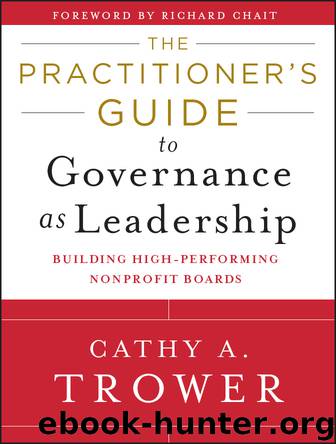The Practitioner's Guide to Governance as Leadership by Cathy A. Trower

Author:Cathy A. Trower
Language: eng
Format: epub
Publisher: Wiley
Published: 2012-10-19T16:00:00+00:00
*For sample “360” questions for boards, see Table 4.3.
TABLE 4.3 Sample 360 Questions for Boards.
The idea behind a 360 review is that each individual learns, anonymously, how others view his or her performance. In business, for example, individuals would be rated by their supervisor, their same-level peers, and by their subordinates. For boards, the idea is that each board member rates all other board members along any number of observable dimensions. The use of 360 review processes is controversial and should not be carelessly applied in any setting. Although this sort of assessment holds a certain appeal to those wanting to learn about how they personally are viewed by others, and by those seeking a mechanism to help troublesome board members “see the light”, such feedback can be divisive and cause anxiety, tension, or friction, and can even be explosive. Those who wish to conduct a 360 board review will need a mechanism, such as an outside third party, to ensure confidentiality and anonymity. Table 4.3 shows a sampling of questions that can be used for this purpose, with a four-point scale. Some boards use a five-point scale with a neutral—“neither agree nor disagree”—rating or add an answer of “don’t know.”
Although not all boards have used the process described above, many have found it useful to begin with clarifying what is expected of board members in terms of board service. A good example of this is the MGH Institute of Health Profession’s “Trustee Expectations and Statement of Commitment” (Exhibit 4.3). The statement speaks to “evidence” of trustee commitment to the organization’s mission, including guidelines about: attendance at meetings, retreats, and events; committee service; preparation for meetings; philanthropic and advocacy support; conflict of interest; confidentiality; appropriate constituency representation; and participation in board assessment. Board members get a good sense of what they are supposed to do, but not necessarily how they are supposed to comport themselves.
Exhibit 4.3: MGH Institute of Health Professions, Trustee Expectations and Statement of Commitment
Members of the Board of Trustees of the MGH Institute of Health Professions serve as ultimate fiduciaries in their oversight of institutional affairs in accordance with the MGH Institute’s charter, bylaws, evolving mission and purpose, and institutional plans. In serving in this critical capacity as a governing board, the board members hereby clarify for themselves, and for those invited to join them, what is expected of individual members.
All trustees are expected to have a deep and abiding commitment to the Institute’s mission, goals, values, and heritage, and to uphold and strengthen the organization’s commitment to prepare clinical leaders in the health professions, as well as the Institute’s commitment to diversity and a community that considers all people equally.
Individual trustees are expected to be actively engaged members of the Board and the Institute community as evidenced by:
1. Attending a minimum of three of the four annual meetings, with at least two in person, although preferably attending all meetings, and in person whenever possible.
2. Serving on at least one board member committee, attending a majority of the committee’s meetings, and accepting other assignments from the board chair from time to time.
Download
This site does not store any files on its server. We only index and link to content provided by other sites. Please contact the content providers to delete copyright contents if any and email us, we'll remove relevant links or contents immediately.
Hit Refresh by Satya Nadella(9125)
The Compound Effect by Darren Hardy(8942)
Change Your Questions, Change Your Life by Marilee Adams(7758)
Nudge - Improving Decisions about Health, Wealth, and Happiness by Thaler Sunstein(7690)
The Black Swan by Nassim Nicholas Taleb(7106)
Deep Work by Cal Newport(7063)
Rich Dad Poor Dad by Robert T. Kiyosaki(6607)
Daring Greatly by Brene Brown(6501)
Principles: Life and Work by Ray Dalio(6421)
Playing to Win_ How Strategy Really Works by A.G. Lafley & Roger L. Martin(6232)
Man-made Catastrophes and Risk Information Concealment by Dmitry Chernov & Didier Sornette(6004)
Big Magic: Creative Living Beyond Fear by Elizabeth Gilbert(5754)
Digital Minimalism by Cal Newport;(5749)
The Myth of the Strong Leader by Archie Brown(5498)
The Slight Edge by Jeff Olson(5410)
Discipline Equals Freedom by Jocko Willink(5378)
The Motivation Myth by Jeff Haden(5204)
The Laws of Human Nature by Robert Greene(5171)
Stone's Rules by Roger Stone(5081)
